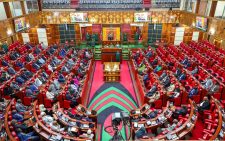Dramatists must keep creative conceit out of schools

Playwrights across the world, like other artists, have long borne the moral burden of society. They challenge societal ills, elevate virtues and heroic activities of heroes and heroines, and most importantly speak truth to power. Unlike musicians or novelists, playwrights and poets possess a distinct and often dangerous power: enactment.
The stage does NOT just tell stories, it embodies them. It forces audiences to watch, listen, feel, and confront realities they might prefer to ignore, and the enactment of Echoes of War would have done all these.
This tradition of using art to provoke and inspire is as old as thought itself. Plato, the father of Western philosophy, was emphatic about the role of art in moralising society. Art, to him, was not merely decorative or entertaining, it was didactic. It was supposed to shape ethical consciousness, instil civic responsibility, and call out societal decay. But not all artists have the power to capture the imagination of society or their target audience. Longinus, another Greek great philosopher speaks of the creative conceit and the ability of the artist to take us to the sublime.
The artist therefore must make that which is important in society interesting. Longinus talks of the sublime – an elevated quality of writing that evokes a sense of awe and wonder, going beyond mere instruction, delight, or persuasion, and it does seem Cleophas Malala has the fluid ability to make the important issues in the society sublime in his plays.
Nevertheless, it is precisely the capacity to moralise, and to do so creatively, that makes drama both revolutionary and threatening. In Kenya, no name captures this revolutionary spirit more than Ngugu wa Thiong’o. While his novels such as A Grain of Wheat, The River Between, and Matigari have ignited political consciousness across generations, it was his co-written play I Will Marry When I Want, co-authored with Ngugi wa Mirii, that got him into serious trouble with the State – resulting in arrest and eventual exile. The message wasn’t the problem; it was both the message and the mode of delivery. Plays, when enacted, become undeniable. The audience doesn’t imagine injustice, they witness it.
The banning of Echoes of War at the national drama festival is part of this same long arc of State censorship. The play, much like Francis Imbuga’s Betrayal in the City or Man of Kafira, held up a mirror to the political class. But this time, in the digital era, the stakes were even higher. After the court debacle, smartphones were on standby. Had the play been enacted, it would have been recorded, and the footage would have spread like wildfire across TikTok, WhatsApp, and X – turning stage critique into national outrage. The establishment understand this and moved swiftly, not in dialogue, but in repression.
And yet, there is something profoundly unconstitutional about that move. The right to freedom of expression is only limited in cases of hate speech or incitement. By all accounts, Echoes of War did not incite violence, it warned against it. It was, if anything, a moral fable echoing Plato’s thesis.
But again, it is not just the content that rattles power, it is the embodiment of that content, the creative conceit of dramatists who bring to life the injustices others only theorise about. This explains why Soyinka spent 27 months in detention for his politically charged plays like Kongi’s Harvest, while Achebe, whose novels are no less critical, did not face the same wrath. The stage pierces where prose merely scratches.
In silencing playwrights, the State isn’t just censoring art, it is fearing its own reflection. Imbuga wrote, “When the madness of an entire nation disturbs a solitary mind, it is not enough to say the man is mad.” Our playwrights are not mad. They are awake. They are courageous. And they are armed with the most dangerous weapon of all – the truth. But they should steer their creative conceit out of our schools and innocent children. Kenya National Theatre should be the stage for creative criticism of the establishment. Nevertheless, when a play is banned, or a dramatist is arrested, detained, or dismissed, we must ask not what the script said, but why the State is afraid of its performance.
Because in the end, even in the age of digital virality, repression, and performative politics, the pen is mightier than the sword and the artist needs of necessity to moralise and not antagonise the society.
— The writer is a media studies Researcher















